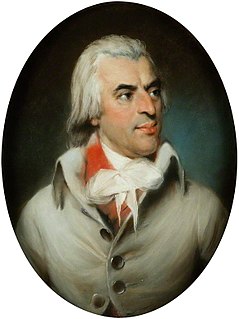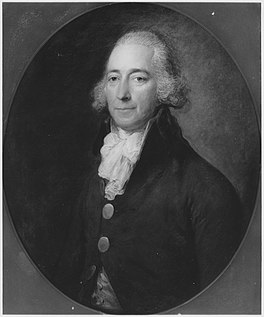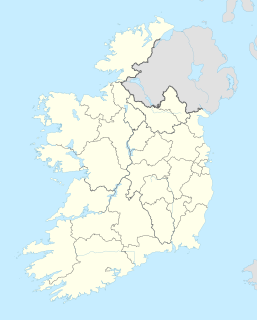
Edmund Burke was an Anglo-Irish statesman and philosopher. Born in Dublin, Burke served as a member of parliament (MP) between 1766 and 1794 in the House of Commons with the Whig Party after moving to London in 1750.

Sir James Mackintosh FRS FRSE was a Scottish jurist, Whig politician and historian. His studies and sympathies embraced many interests. He was trained as a doctor and barrister, and worked also as a journalist, judge, administrator, professor, philosopher and politician.

Arthur Young was an English writer on agriculture, economics and social statistics, and a campaigner for the rights of agricultural workers. Not himself successful as a farmer, he built on connections and activities as a publicist a substantial reputation as an expert on agricultural improvement. After the French Revolution of 1789, his views on its politics carried weight as an informed observer, and he became an important opponent of British reformers. Young is considered a major English writer on agriculture, but he is best known as a social and political observer. Also read widely were his Tour in Ireland (1780) and Travels in France (1792).

Anthony Wood, who styled himself Anthony à Wood in his later writings, was an English antiquary.

William Windham was a British Whig statesman. Elected to Parliament in 1784, Windham was attached to the remnants of the Rockinghamite faction of Whigs, whose members included his friends Charles James Fox and Edmund Burke. Windham soon became noted for his oratory in the House of Commons.

Algernon Capell, 2nd Earl of Essex PC of Cashiobury House, Watford, Hertfordshire, was an English nobleman, a soldier and courtier.

The Club or Literary Club is a London dining club founded in February 1764 by the artist Joshua Reynolds and essayist Samuel Johnson, with Edmund Burke, the Irish philosopher-politician.
David Bromwich is Sterling Professor of English at Yale University.
The High Sheriff of Tipperary was the Sovereign's judicial representative in County Tipperary. Initially an office for lifetime, assigned by the Sovereign, the High Sheriff became annually appointed from the Provisions of Oxford in 1258. Besides his judicial importance, he had ceremonial and administrative functions and executed High Court Writs.
Dame Harriet Jane Backhouse Findlay, DBE was an English political activist and philanthropist.

The House of Menander is one of the richest and most magnificent houses in ancient Pompeii in terms of architecture, decoration and contents, and covers a large area of about 1,800 square metres (19,000 sq ft). Its quality means the owner must have been an aristocrat involved in politics, with great taste for art. Mussolini held a lunch party in Room 18 when he visited Pompeii in 1940.

Ballitore is a village in County Kildare, Ireland, sometimes spelt Ballytore.
There have been two baronetcies created for persons with the surname Simeon, one in the Baronetage of England and one in the Baronetage of the United Kingdom. As of 2014 one creation is extant.
Peter James Marshall, is a British historian known for his work on the British empire, particularly the activities of British East India Company servants in 18th-century Bengal, and also the history of British involvement in North America during the same period.

Letters on a Regicide Peace or Letters ... on the Proposals for Peace with the Regicide Directory of France were a series of four letters written by Edmund Burke during the 1790s in opposition to Prime Minister William Pitt's seeking of peace with the revolutionary French Directorate. It was completed and published in 1796.
Alastair Blair Worden, FBA, usually known by his middle name Blair, is a historian, among the leading authorities on the period of the English Civil War and on relations between literature and history more generally in the early modern period. He matriculated as an undergraduate at Pembroke College, Oxford, in 1963. After spending a year as a visiting student at Harvard he began graduate research at Oxford in 1967. After a period as a Fellow of St Edmund Hall, Oxford, teaching History, he took up a position as a Professor at Royal Holloway, University of London. As of 2011 he is an Emeritus Fellow of St Edmund Hall. He is well known for his revolutionary article "Oliver Cromwell and the Sin of Achan", which changed established historical perceptions about what exactly caused Cromwell to reject the offer of the Crown.
The New Annual Register was an annual reference work, founded in 1780 by Andrew Kippis in London, England. It recorded and analysed the year's major events, developments and trends, throughout the world, as a rival to the Annual Register appearing from 1758, under the editorship of Edmund Burke. After Kippis died in 1795 it was taken on by Thomas Morgan (1752–1821). George Gregory edited it, and changed its Whig politics to Tory at the time of the Addington ministry. It was published until 1825.
William Burke was an English pamphleteer, official, and politician. He was one of the supposed authors of Junius's Letters.

An Appeal from the New to the Old Whigs is a book written by the Irish Whig MP and philosopher, Edmund Burke, published on 3 August 1791.
Dorothy Clement was the mistress of Edward Walpole and mother of his four children, including Maria Walpole, who became Duchess of Gloucester and Edinburgh upon her marriage to Prince William Henry, Duke of Gloucester and Edinburgh. Daughter of a Darlington postmaster, she is an ancestor of Prince William, Duke of Cambridge, through her granddaughter Lady Anna Seymour.












